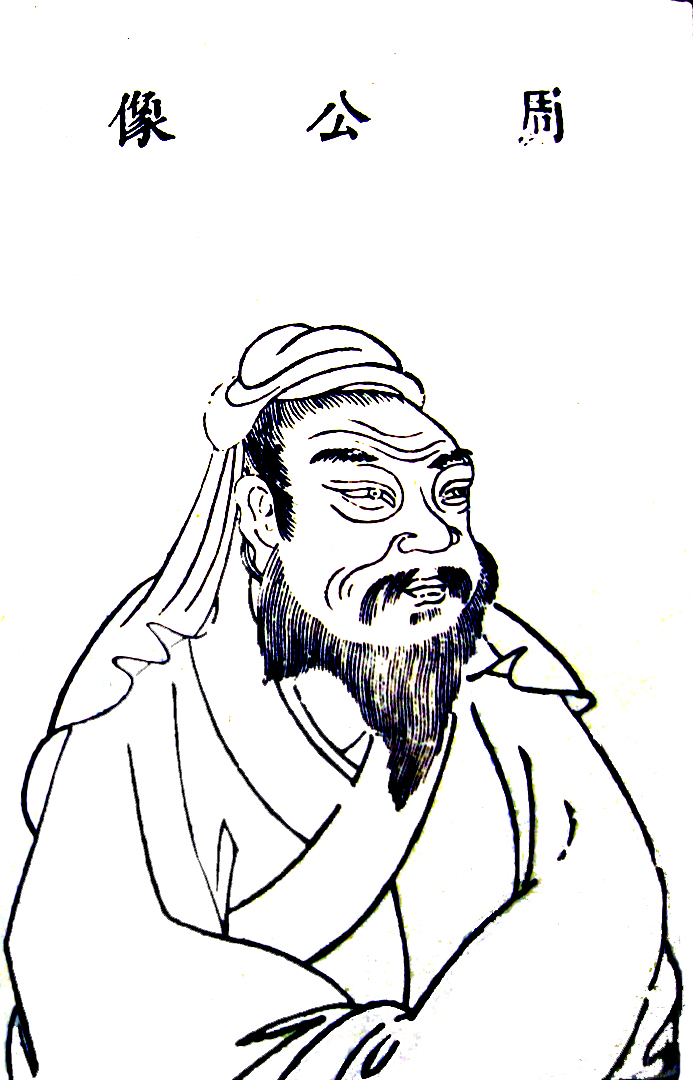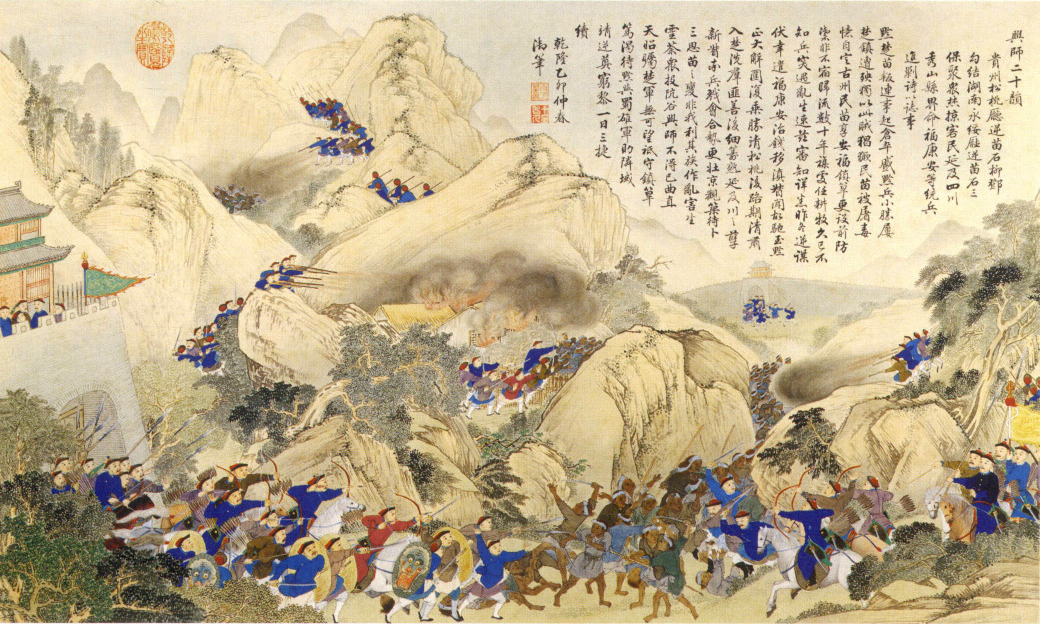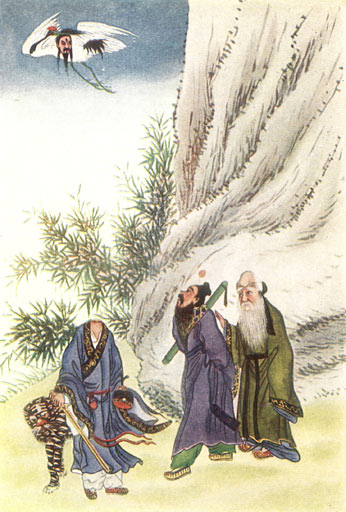|
Rebellion Of The Three Guards
The Rebellion of the Three Guards (), or less commonly the Wu Geng Rebellion (), was a civil war, instigated by an alliance of discontent Zhou princes, Shang loyalists, vassal states and other non-Zhou peoples against the Western Zhou government under the Duke of Zhou's regency in late 11th century BC. After the fall of the Shang dynasty, King Wu of Zhou had appointed his younger brothers Guanshu, Caishu and Huoshu as the "Three Guards" of the East to secure the newly conquered Shang lands. After his death and his young son King Cheng's coronation, King Wu's brother Dan, the Duke of Zhou, declared himself regent and took over the court. This aroused the anger of the Three Guards who suspected Dan of usurpation and believed that they should serve as regents. Allied with many separatist eastern nobles, Shang loyalists under Prince Wu Geng, and several Dongyi () and Huaiyi () states, they rose in rebellion against the Duke of Zhou. The latter then launched a second "eastern campa ... [...More Info...] [...Related Items...] OR: [Wikipedia] [Google] [Baidu] |
Zhou Dynasty
The Zhou dynasty ( ; Old Chinese ( B&S): *''tiw'') was a royal dynasty of China that followed the Shang dynasty. Having lasted 789 years, the Zhou dynasty was the longest dynastic regime in Chinese history. The military control of China by the royal house, surnamed Ji, lasted initially from 1046 until 771 BC for a period known as the Western Zhou, and the political sphere of influence it created continued well into the Eastern Zhou period for another 500 years. The establishment date of 1046 BC is supported by the Xia–Shang–Zhou Chronology Project and David Pankenier, but David Nivison and Edward L. Shaughnessy date the establishment to 1045 BC. During the Zhou dynasty, centralized power decreased throughout the Spring and Autumn period until the Warring States period in the last two centuries of the dynasty. In the latter period, the Zhou court had little control over its constituent states that were at war with each other until the Qin state consolidated power and forme ... [...More Info...] [...Related Items...] OR: [Wikipedia] [Google] [Baidu] |
Dongyi
The Dongyi or Eastern Yi () was a collective term for ancient peoples found in Chinese records. The definition of Dongyi varied across the ages, but in most cases referred to inhabitants of eastern China, then later, the Korean peninsula, and Japan. As such, the name "Yí" was something of a catch-all and was applied to different groups over time. According to the earliest Chinese record, the '' Zuo Zhuan'', the Shang Dynasty was attacked by King Wu of Zhou while attacking the Dongyi and collapsed afterward. Ancient inhabitants of Eastern China Oracle bone inscriptions from the early 11th century BCE refer to campaigns by the late Shang king Di Yi against the ''Rénfāng'' (), a group occupying the area of southern Shandong and Jianghuai (northern Anhui and Jiangsu). Many Chinese archaeologists apply the historical name "Dongyi" to the archaeological Yueshi culture (1900–1500 BCE). Other scholars, such as Fang Hui, consider this identification problematic because of the ... [...More Info...] [...Related Items...] OR: [Wikipedia] [Google] [Baidu] |
List Of Rebellions In China
This is an incomplete list of some of the rebellions, revolts and revolutions that have occurred in China. Zhou dynasty * Rebellion of the Three Guards (late 11th century BC) was a three-year rebellion of the Shang and three uncles of King Cheng of Zhou against their nephew and his regent, the Duke of Zhou. * Compatriots Rebellion (842 BC) was an uprising against King Li of Zhou, ending with the King's exile, establishing the interregnum Gonghe Regency until King Xuan of Zhou took the throne. Qin dynasty * The Dazexiang Uprising (; July – December 209 BC) was the first uprising against Qin rule following the death of Qin Shi Huang. Chen Sheng and Wu Guang were both army officers who were ordered to lead their bands of commoner soldiers north to participate in the defense of Yuyang (漁陽). However, they were stopped halfway in Dazexiang, Qixian (modern Suzhou, Anhui) by a severe rainstorm and flooding. Harsh Qin law stated that anyone who showed up l ... [...More Info...] [...Related Items...] OR: [Wikipedia] [Google] [Baidu] |
Wu Geng
Wu Geng or Wugeng (Chinese: ''Wǔgēng''), a.k.a. ''Lùfù'', was an ancient Chinese noble who was the son of Zhou, the last king of the Shang. After his father executed Bigan by cutting out his heart, Wugeng fled to Feng, the capital of the Zhou state, together with his uncles Weizi and Weizhong to plead King Wu of Zhou for help. Shortly afterward King Wu attacked the Shang and defeated King Zhou at the Battle of Muye, thus establishing the Zhou dynasty. Wugeng was allowed to stay in Yin, the old Shang capital, and rule it as a princedom and a vassal lord to King Wu. After King Wu's death and the ascension of his young son Cheng, Wugeng joined the failed rebellion of the Three Guards against the regent Duke of Zhou. He in turn was joined by the " Eastern Barbarian" states of Yan, Pugu, and Xu. In the second year of the war, Wugeng was killed in battle and Yin was devastated, ending the Shang princedom. In popular culture Wu Geng's life after the fall of Shang was fictiona ... [...More Info...] [...Related Items...] OR: [Wikipedia] [Google] [Baidu] |
Shu Du Of Cai
Cai Shu Du or Shu Du of Cai (Chinese: , given name Du (), was the first ruler of the State of Cai. Du was the fifth son of King Wen of Zhou and his wife Taisi (). He had ten brothers and eight half-brothers. His elder brothers were Kao (Boyi Kao), Fa (King Wu of Zhou), Xian (Guan Shu), and Dan (the Duke of Zhou). He was given the fief of Cai by King Wu after the overthrow of the last Shang king, Zhou. Du's realm centered on present-day Shangcai, Henan. He and his brothers Guan Shu Xian and Huo Shu Chu (霍叔處) were known as the Three Guards, but when King Wu died and the Duke of Zhou assumed the regency for the young King Cheng, they rebelled along with Wu Geng. The Duke of Zhou was able to suppress the rebellion and Du was exiled, although Cheng eventually recreated the realm of Cai as a grant to Du's son Zhong Hu Cai Zhong Hu ( Chinese: , lit. "Hu, Elder of Cai"), born Ji Hu (), was the only known son of Ji Du, the first lord of Cai. Ji Du was removed from his office ... [...More Info...] [...Related Items...] OR: [Wikipedia] [Google] [Baidu] |
Guanshu Xian
Guan Shu Xian () was the first and only ruler of the Chinese state of Guan and a younger of brother of King Wu of Zhou. He was the third son of King Wen of Zhou, and one of the Three Guards responsible for overseeing the eastern lands of the newly founded Zhou dynasty. Three years into the first reign, King Wu died of an illness and left his underage son, Song, as king. Thus Dan, the Duke of Zhou - who was the fourth son of King Wen - fearing that the kingdom might fall apart under an inexperienced king, took over government affairs as regent. This angered Guanshu Xian and the other two guards, who felt the Duke of Zhou had usurped the throne, and thus they joined Zi Wugeng, the son of the last king of Shang and nominal ruler of Yin, the old Shang capital, and began a rebellion against the regent. This was known as the Rebellion of the Three Guards. Following three years of war, the rebellion was crushed and Guanshu Xian, considered its main leader, was executed and the state of ... [...More Info...] [...Related Items...] OR: [Wikipedia] [Google] [Baidu] |
Bo Qin
Bo Qin (Chinese: , p ''Bóqín''), also known as Qin Fu (禽父), was the founder of the State of Lu during the early Zhou dynasty. Born into the royal Ji family (), he was the eldest son of the Duke of Zhou. Instead of inheriting his father's estate in Zhou, he was granted the newly established State of Lu centered at Qufu. He is thought to have ruled Lu from around 1042 to 997 BC. His posthumous name was the Great Duke (, ''Tàigōng''). He was succeeded by his sons Duke Kao and Duke Yang. The main line of the Duke of Zhou's descendants came from Bo Qin's third son Yu (魚) whose descendants adopted the surname Dongye (東野). The Duke of Zhou's offspring held the title of Wujing Boshi (五经博士; 五經博士; Wǔjīng Bóshì). Duke Huan of Lu's son through Qingfu (慶父) was the ancestor of Mencius Mencius ( ); born Mèng Kē (); or Mèngzǐ (; 372–289 BC) was a Chinese Confucianism, Confucian Chinese philosophy, philosopher who has often been ... [...More Info...] [...Related Items...] OR: [Wikipedia] [Google] [Baidu] |
Jiang Ziya
Jiang Ziya ( century BC – century BC), also known by several other names, was a Chinese noble who helped kings Wen and Wu of Zhou overthrow the Shang in ancient China. Following their victory at Muye, he continued to serve as a Zhou minister. He remained loyal to the regent Duke of Zhou during the Rebellion of the Three Guards; following the Duke's punitive raids against the restive Eastern Barbarians or ''Dongyi'', Jiang was enfeoffed with their territory as the marchland of Qi. He established his seat at Yingqiu (in modern Linzi). Names The first marquis of Qi bore the given name Shang. The nobility of ancient China bore two surnames, an ancestral name and a clan name. His were Jiang (姜) and Lü (呂), respectively. He had two courtesy names, Shangfu (尚父; lit. "Esteemed Father") and Ziya (lit. "Master Ivory, Master Tusk"), which were used for respectful address by his peers. The names Jiang Shang and Jiang Ziya became the most common after th ... [...More Info...] [...Related Items...] OR: [Wikipedia] [Google] [Baidu] |
Duke Of Shao
Shi, Duke Kang of Shao (died 1000 BC), or Ji Shi, also known as the Earl of Shao, was a high-ranking minister of the early Zhou dynasty. He was a younger brother of King Wu, the founding king of Zhou. Siding with his half-brother Duke of Zhou, Duke of Shao helped suppress the Rebellion of the Three Guards after King Wu's death. During the reigns of King Wu's son King Cheng and King Cheng's son King Kang, Duke of Shao held the post of Grand Protector (太保), one of the Three Ducal Ministers. And he is the ancestor of rulers of Yan, the one of states in the Warring State War is an intense armed conflict between states, governments, societies, or paramilitary groups such as mercenaries, insurgents, and militias. It is generally characterized by extreme violence, destruction, and mortality, using regul ... era References * * {{China-hist-stub Monarchs of Yan (state) 10th-century BC Chinese people Zhou dynasty people ... [...More Info...] [...Related Items...] OR: [Wikipedia] [Google] [Baidu] |
King Cheng Of Zhou
King Cheng of Zhou (), personal name Ji Song (姬誦), was the second king of the Chinese Zhou dynasty. The dates of his reign are 1042–1021 BCE or 1042/35–1006 BCE. His parents were King Wu of Zhou and Queen Yi Jiang (邑姜). King Cheng was young when he ascended the throne. His uncle, Duke of Zhou, fearing that Shang forces might rise again under the possible weak rule of a young ruler, became the regent and supervised government affairs for several years. Duke of Zhou established the eastern capital at Luoyang, and later defeated a rebellion by Cheng's uncles Cai Shu, Guan Shu and Huo Shu.Hucker, Charles O. (1978). China to 1850: a short history. Stanford University Press. King Cheng later stabilized the Zhou dynasty's border by defeating several barbarian tribes along with the Duke of Zhou. Family Queens: * Wang Si, of the Si clan (), the mother of Crown Prince Zhao Sons: * Crown Prince Zhao (; 1040–996 BC), ruled as King Kang of Zhou from 1020 to 996 BC Ancest ... [...More Info...] [...Related Items...] OR: [Wikipedia] [Google] [Baidu] |
Duke Of Zhou
Dan, Duke Wen of Zhou (), commonly known as the Duke of Zhou (), was a member of the royal family of the early Zhou dynasty who played a major role in consolidating the kingdom established by his elder brother King Wu. He was renowned for acting as a capable and loyal regent for his young nephew King Cheng, and for successfully suppressing the Rebellion of the Three Guards and establishing firm rule of the Zhou dynasty over eastern China. He is also a Chinese culture hero credited with writing the ''I Ching'' and the ''Book of Poetry'', and establishing the '' Rites of Zhou''. Life His personal name was Dan (). He was the fourth son of King Wen of Zhou and Queen Tai Si. His eldest brother Bo Yikao predeceased their father (supposedly a victim of cannibalism); the second-eldest defeated the Shang Dynasty at the Battle of Muye around 1046 BC, ascending the throne as King Wu. King Wu distributed many fiefs to his relatives and followers and Dan received the ancestral territory of ... [...More Info...] [...Related Items...] OR: [Wikipedia] [Google] [Baidu] |
Xu (state)
The State of Xu () (also called Xu Rong () or Xu Yi () by its enemies) was an independent Huaiyi state of the Chinese Bronze Age that was ruled by the Ying family () and controlled much of the Huai River valley for at least two centuries. It was centered in northern Jiangsu and Anhui. An ancient but originally minor state that already existed during the late Shang dynasty, Xu was subjugated by the Western Zhou dynasty around 1039 BC, and was gradually sinified from then on. It eventually regained its independence and formed a confederation of 36 states that became powerful enough to challenge the Zhou empire for supremacy over the Central Plain. Able to consolidate its rule over a territory that stretched from Hubei in the south, through eastern Henan, northern Anhui and Jiangsu, as far north as southern Shandong, Xu's confederation remained a major power until the early Spring and Autumn period. It reached its apogee in the mid 8th century BC, expanding its influence as far a ... [...More Info...] [...Related Items...] OR: [Wikipedia] [Google] [Baidu] |


_and_%22弓%22_(meaning_bow).jpg)



